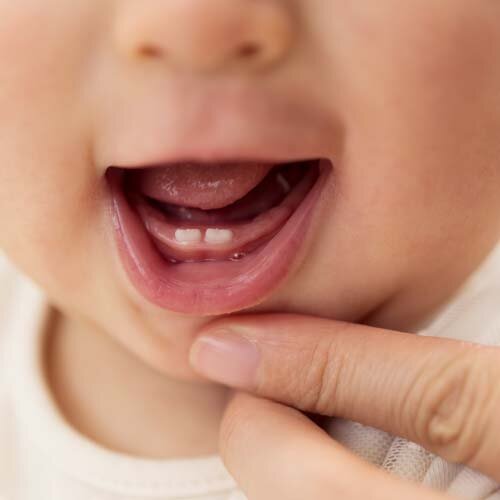My baby’s teeth are coming in crooked: What should I do?
So, your baby’s teeth seem like they are coming in crooked. At what point should you be worried? Will this impact their future oral health?
Let’s take a look at the causes of crooked baby teeth and whether or not it’s something to worry about.
Need more general advice about your child’s first baby teeth?
Check out our complete guide to an infant’s first teeth.
First, are crooked baby teeth really a problem?
The very short answer is: Yes and no.
It’s actually quite normal for baby teeth to come in slightly crooked. Milk teeth are placeholders for a baby’s adult teeth, helping guide them in as they develop and erupt later in life. This development can still occur perfectly normally even if an infant’s milk teeth aren’t quite straight.
Learn more: “When your baby’s teeth start to fall out: A guide”
But, when the misalignment is more serious, it could cause problems
There are a number of problems associated with particularly crooked baby teeth, which we’ve outlined in detail below. If a child’s first teeth come in overcrowded, misaligned, or severely out of place, some of these problems may eventuate and, in turn, cause more serious dental health problems.
When to seek a dentist’s help with crooked baby teeth
In most cases, if your child’s baby teeth are only slightly crooked (i.e. a common misalignment is for the front two lower teeth to form a slight ‘V’ shape), you probably don’t need to travel to your dentist for help.
But, if you notice any of the following then it is worth considering seeking a professional opinion:
Missing baby teeth: Bearing in mind milk teeth don’t fully come in until a child is around two or three years old, so teeth will naturally be missing until then.
Overcrowding of teeth: Which could create symptoms like an overbite (top teeth stick out very far beyond bottom teeth), underbite (the opposite), or open bite (where the top and bottom front teeth don’t meet).
Too many teeth: Also known as hyperdontia, this is where more teeth develop than there’s meant to be. Sometimes extra teeth appear next to or between regular teeth, causing discomfort, chewing problems and other symptoms.
Even if your dentist tells you everything is fine and to just keep an eye on things, at least you’ll have some peace of mind regarding your child’s development.
Let’s look deeper at crooked teeth
What causes crooked teeth?
Genetics
One of the most common causes of crooked teeth is simple hereditary genetics. If you or your partner had crooked teeth as a child, there’s a good chance your infant may develop in the same way.
Genetics can give children a predisposition to crooked teeth from a developmental standpoint, or it could also lead to having a jaw size that is too small (leading to overcrowding) or a misaligned jaw (leading to misaligned teeth).
Thumb sucking or pacifiers
Pacifiers and thumb sucking are perfectly healthy for a very young infant, but once your baby starts to develop baby teeth and especially when they have most or all of their baby teeth, these habits could actually do more harm than good.
Excessive sucking of a pacifier, in particular, can push the front teeth open over time, leading to an open bite. They can also change the shape of the roof of the mouth, lead to misalignment in developing teeth, and affect the eruption of adult teeth (leading to crooked permanent teeth).
As your baby develops more teeth, it’s best to try to wean them off these habits.
Learn more: “When to wean your child off dummies”
Tooth decay
As we mentioned earlier, baby teeth are there to help adult teeth grow properly later in life. If any of these milk teeth are damaged by tooth decay and lost, it can impact the future development of adult teeth.
Injury
An injury to the face, much like tooth decay, can cause baby teeth to prematurely fall out – potentially leading to crooked adult teeth if left untreated. Injuries can also cause problems with the jaw and its natural alignment, which as we know can also lead to misaligned teeth.
Problems associated with crooked baby teeth
Tooth decay/gum disease
Crooked teeth can lead to an increased risk of tooth decay and gum disease. That’s because when teeth come through abnormally aligned, it can make it harder to brush certain parts of the teeth – meaning you aren’t properly attacking the bacteria there.
Learn more: Gum disease
Problems with adult teeth
As we’ve mentioned a couple of times, milk teeth are placeholders for adult teeth and those permanent teeth require baby teeth in order to develop properly.
Milk teeth save space in the mouth. When they fall out prematurely or they’re in the wrong place, developing adult teeth may drift over into the gap, meaning that any new adult teeth can’t erupt out of the space properly – they themselves may then come in crooked.
Speech difficulties
We need our teeth to help us speak properly. If your infant’s milk teeth come in misaligned, this can affect their ability to properly articulate sounds and, therefore, change or impact their speech development.
Chewing difficulties
If your infant cannot chew properly due to their teeth not quite lining up, it could give them digestion problems such as bloating, indigestion, acid reflux and more.
Wear and tear to teeth
When teeth don’t connect properly, or they connect in the wrong places, it can cause an increase in wear and tear around the mouth. Headaches may be a symptom of such wear, as well as discomfort or strain in the jaw. Excessive wear can also grind down teeth or cause cracking.
How to treat crooked baby teeth
The best way to treat crooked teeth in an infant is to consult a dentist with a specialty in orthodontics as soon as you think there’s a problem.
Orthodontics is the process of straightening teeth and can involve a number of procedures that you’re likely familiar with: braces and aligners, for example. By booking a consultation early, your orthodontist will be able to recommend an appropriate treatment (if any is required) to get onto the problem quickly to prevent long-term issues.
Early interceptive orthodontics
Braces are often given to children developing their adult teeth, as straightening these tends to be more important than straightening baby teeth which are just going to fall out.
That said, early interceptive orthodontics can be used to correct developmental problems in milk teeth and a child’s jaw shape/size so that they do not cause future problems when permanent teeth erupt. Indeed, with early treatment, sometimes ongoing orthodontics are not required.
Not sure if your child needs early interceptive orthodontics? You’ll need to talk to an orthodontist – see below!
Finding an orthodontist in Whangārei
Here at Kowhai Dental, we’re able to provide high-quality orthodontics to Northland families, even those on a limited budget.
Learn more:
— Orthodontics at Kowhai Dental
— Payment options
— Affording the dentist in Northland: What help is available?
When you’re ready to book your appointment, or if you have questions, call us on 09 430 0707 or book online today.


